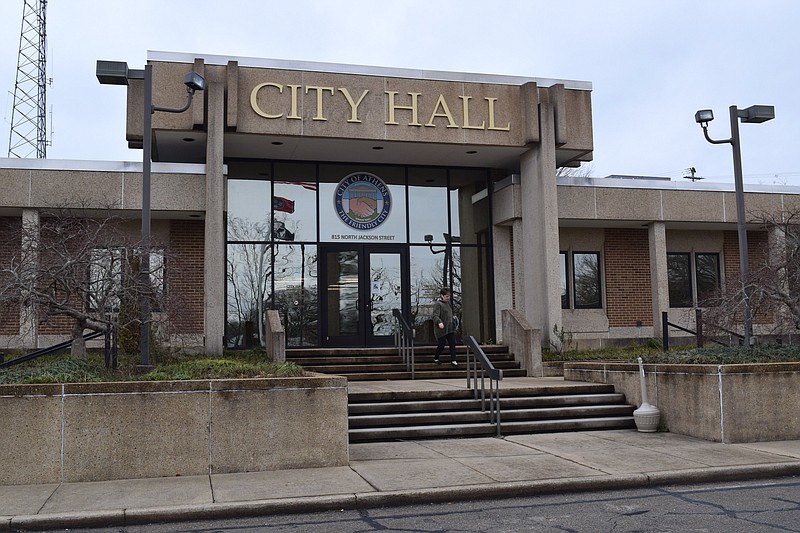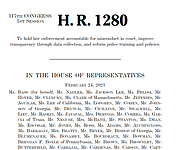An Athens, Tennessee, man has filed suit against the city of Athens and city manager C. Seth Sumner alleging violations of state open records laws and fraud in misrepresenting charges for copies of public records that totaled almost $1,000.
Larry Eaton, an Athens business owner and resident, is asking the court for an injunction against the city preventing violations of the Open Meetings Act, a year of court oversight with required semiannual compliance reports on open meetings, the adoption of policies for citizens' inspection and copying of records, unspecified damages, punitive damages and court costs, according to documents filed March 24 in McMinn County Chancery Court.
The suit isn't about money, according to Eaton.
Eaton said city officials didn't properly keep City Council meeting minutes and Sumner retaliated against him for his public records requests by charging him outrageous rates and oddly watermarking documents he requested when he contends public records requested by most others weren't getting the same treatment. He contends in the suit the watermarking was intended to harass and intimidate him.
"I don't care about anything but making sure that other citizens do not have to go through what I've had to go through with my government by asking questions," Eaton said Wednesday in a telephone interview.
Matthew C. Rogers, one of Eaton's attorneys in the suit, contends the Athens resident is taking up the fight for his fellow citizens.
"Our client Larry Eaton is a concerned citizen that is very proud of his town and his community, and he wants it to be a place he can continue to be proud of," Rogers said in a telephone interview. "There have been significant discrepancies over the last few years in the policies and the procedures at the city of Athens that have given Larry some real concerns about what's being done there," he said.
Eaton took on a personal effort "to check those things and has been met with some real resistance," Rogers said.
"What he believes and what our complaint says is there is some misconduct by city officials that cost not only our client money but the taxpayers money. And Larry's willing to address those publicly and he hopes to get some change there so it doesn't continue to harm him or other citizens," he said.
Athens officials declined to comment specifically on the suit.
"As with all complaints filed against the city and the city manager, it was provided to the insurance carrier for the city, and legal counsel has been retained for both the city and Mr. Sumner," city attorney Chris Trew said Friday in an email. "For this reason, and because I generally do not comment about pending litigation, I respectfully will not offer any comments about this suit."
Sumner didn't immediately respond to a separate request for comment.
According to the suit, the first of three counts alleges a violation of state law stemming from a meeting held Aug. 10 and that meeting's continuation on Oct. 18 related to a hearing on allegations leveled against Sumner by then-Police Chief Cliff Couch.
Requested meeting minutes were not "promptly" recorded or provided - as required by state law - and when he got a response from records custodian Leslie McKee, Eaton was told no minutes were prepared for those meetings, Eaton contends in the suit.
The lack of minutes is a violation of state law requiring they be kept, the suit states.
The two-part called meeting was held over accusations by Couch that Sumner was interfering with his authority as chief and retaliating against him for questioning the apparent disappearance in 2020 of city-owned surveillance cameras the chief believed were last in the possession of Sumner. Sumner in the meeting on the matter contended he returned the missing cameras.
Sumner fired Couch before the Oct. 18 meeting, which picked up where the other left off. At the end of the October meeting, Sumner was suspended for two weeks in a 4-1 council vote, the Times Free Press previously reported.
Eaton wanted to know more about the decision and filed a public records request Dec. 6 for the August and October meeting minutes, according to the suit.
The suit cites state law stating, in part, "The minutes of a meeting of any such government body shall be promptly and fully recorded, shall be open to public inspection and shall include, but not be limited to, a record of persons present, all motions, proposals and resolutions offered, the result of any votes taken and a record of individual votes in the event of a roll call."
Other City Council meetings took place subsequent to the Aug. 10 and Oct. 18 meetings, and minutes of those meetings were prepared, the suit states, but eight days after his request was filed Eaton was told no meeting minutes had been prepared for meetings about the security camera issue, resulting in a denial of his request.
Eaton's suit contends city officials didn't prepare minutes of those meetings because "the meetings in question were embarrassing and problematic for the city and/or Sumner."
The second count in the suit stems from the same area of Tennessee law except in regard to a state schedule of "reasonable charges" for governmental retrieval and preparation of requested documents.
"The Tennessee comptroller of the treasury publishes a 'Schedule of Reasonable Charges' regarding charges for open records requests," the suit states, citing the schedule. "A records custodian shall utilize the most cost-efficient method of producing requested records. Accordingly, a records custodian should strive to utilize current employees at the lowest practicable hourly wage to fulfill public records requests for copies."
In December 2020, Eaton requested credit card statements from cards assigned to Sumner, according to the suit. Eaton was provided "heavily redacted" copies of the statements, along with a bill for $741.20 for costs of redaction.
In May, Eaton requested Sumner's emails regarding city policies on COVID-19 policies and was again provided heavily redacted copies of the emails and another bill for $209.69 for the preparation of the requested documents, the suit states.
(READ MORE: Chattanooga City Council's redistricting process may have violated open meetings laws)
According to exhibits contained in the suit, Eaton was charged $54.04 per hour for the work to provide the requested documents on the request for emails, specifically identifying Sumner as the city employee doing the work and providing times the work was performed.
"It is unreasonable, and a violation of the promulgated 'schedule of reasonable charges' for Sumner, the highest paid city employee, to be the one personally completing the redaction of these records," the suit states. "By refusing to allow other staff members to complete this redaction, Sumner intentionally acted to artificially increase the cost to Eaton of obtaining these records."
The suit states Eaton obtained other public records he later contended indicate "Sumner was actually using the telephone, sending and receiving text messages, wandering City Hall, speaking with other city employees and participating in unrelated Zoom meetings," and the proof of those allegations will be shown at trial.
In the suit's third count, Eaton contends Sumner's actions amount to fraud.
The charges for hourly labor by Sumner - who according to the suit performed the work himself to provide Eaton's requested public records - "constitute fraud, intentional misrepresentation and/or negligent misrepresentation," the suit states, adding that Eaton should not have been charged for time Sumner spent in other activities unrelated to producing Eaton's requested documents.
The defendants in the suit have 30 days from the date of service to respond to the suit. Trew didn't answer a question about when the defendants were served the suit.
Contact Ben Benton at bbenton@timesfreepress.com or 423-757-6569. Follow him on Twitter @BenBenton.


